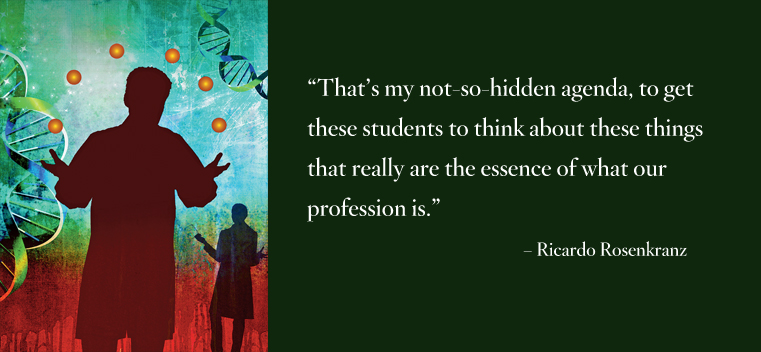
Magic and Medicine
The question comes from across the room. “Did you figure out how to levitate yet?”
It’s an odd query, no doubt, especially in a Feinberg School of Medicine classroom.
But, no, Chinwe Uwalaka hadn’t mastered the illusion yet — and not for lack of trying. The second-year medical student is one of 16 students in Ricardo Rosenkranz’s seminar Magic and Medicine, a 10-hour elective that is part of the Feinberg’s Medical Humanities and Bioethics Program.
Rosenkranz (GFSM96), a neonatologist and assistant professor of clinical pediatrics as well as a talented magician, started thinking about the correlation between magic and medicine when he realized that in both arenas too many practitioners rely on props and technology rather than developing foundational human relationships.
Being a magician, he says, “is not about technology. It’s about the relationship. It’s about meaning.” And it’s the same with medicine. “It seems like doctors these days are so harried, with insurance stuff and paperwork. We’re busy filling in the fields on a computer and not even looking at the patient. There are time pressures, productivity pressures.
“The reaction among my colleagues is, ‘I really want to connect more with my patients, but I don’t have time.’”
Rosenkranz says the skills modeled by the seminar’s guest magicians can help young doctors develop positive rapport with patients. “That’s my not-so-hidden agenda,” he says, “to get these students to think about these things that really are the essence of what our profession is.”
Students in the seminar explore the anthropology of magic — “magic and medicine share the same DNA,” says Rosenkranz. Perhaps more important, the seminar examines medicine as a performance art.
Several master magicians, including trade show star Daniel Orleans (SESP76) and the influential Eugene Burger, Rosenkranz’s mentor and a master of close-up magic, performed during the five-week seminar. They shared some secrets and taught a few tricks but talked much more about the important elements of building a relationship with the audience.
During the third week of class, physicians and magicians participated in a panel discussion about the correlations between their crafts. “They all answered the same questions about how they build relationships,” says Krys Foster, a second-year medical student. “They all agreed that when you make an emotional connection, whether it’s with a patient or the audience, that moment is magical.”
Uwalaka, who is interested in anesthesiology, says at first she was a bit skeptical about the connection between magic and medicine. “But it has made me more acutely aware of how I am perceived and the things I can do to change that perception if it’s not what I want it to be,” she says. “I’m more aware of how I can help alleviate the fear a patient might have by using my body language, my nonverbal cues, to make them more comfortable.
“These skills are a way to incorporate a more personable nature into medicine, to get people to trust you in a totally real way.”
Rosenkranz, who has taught a magic class for health care professionals at McBride’s Magic & Mystery School in Las Vegas and will soon lecture on the topic at Stanford University and elsewhere, says the medical humanities seminars at Feinberg give students a unique opportunity.
Feinberg students enroll in two of nearly 20 medical humanities seminars during each of their first two years as part of the Patient, Physician and Society course. The seminars, which emphasize topics such as ethics, negotiation and economics, include art observation at the Art Institute of Chicago, anatomy pointers in an introduction to sculpture and role-playing in a basic improv workshop.
“The seminars are intended to provide students with the opportunity to explore medicine from the perspective of one or more humanities disciplines,” says Catherine Belling, assistant professor of medical humanities and bioethics. “This can both broaden their perspective on medicine beyond the sciences and allow them to choose seminars either to discover an entirely new way of thinking about medicine or to extend existing interests.”
Uwalaka’s interest in magic goes back to her youth, when she performed magic tricks as a young girl. She hoped to raise her skills to a new level when the Magic and Medicine students put on their own show, the capstone for the seminar, in April.
“If I can come out of four weeks of class and levitate,” she says, “I will have won.”



 Facebook
Facebook Twitter
Twitter Email
Email


